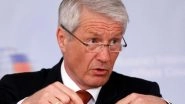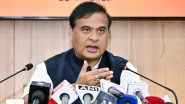New Delhi [India], June 3 (ANI): The upcoming India-Australia virtual summit will be an opportunity for Prime Minister Narendra Modi and his Australian counterpart Scott Morrison to review the broad framework of the relationship in the context of the growing ties between two countries, sources said on Tuesday.
The India-Australia Virtual Leaders' Summit is scheduled to be held on Thursday. This will be the first time that Prime Minister Narendra Modi will be holding a bilateral virtual summit with a foreign leader, sources added.
Since the high-level visit of Morrison to India was in the pipeline, the two leaders decided to continue the engagement even though it was in the form of a virtual meeting, sources said.
This is the first time that India is holding a virtual summit. Australia has already done one such bilateral virtual summit with Singapore in March this year.
"The focus would be on the positive trajectory in bilateral relations during discussions between the two Prime Ministers, who have already met on four occasions on the sidelines of multilateral meetings," sources said.
"The virtual summit will be an opportunity for the two leaders to review the broad framework of the relationship in the context of their growing ties. It will also be an opportunity to discuss their respective responses to the COVID-19 pandemic. A number of MoUs and announcements are being discussed by the officials," they added.
Modi and Morrison have met four times during the last one and a half years -- on the sidelines of East Asia Summit in Singapore in November 2018, on the sidelines of G20 in Osaka in June 2019, on the margins of G7 Summit in Biarritz in August 2019 and on the margins of East Asia Summit in Bangkok in November 2019.
"India and Australia have very warm and friendly relations. The two nations have much in common, underpinned by shared values of pluralistic, Westminster-style democracies, Commonwealth traditions, the long-standing people-to-people ties and sporting links. Our economies have many complementarities with the potential to enhance bilateral trade and investment," sources said.
Due to a better understanding of India's strength and future role, Australia, in its White Paper on Foreign Policy-2017, recognised India as the "pre-eminent maritime power among Indian Ocean countries" and a "front-rank partner of Australia".
During the last five years, bilateral relations between both countries have strengthened and expanded tremendously. Framework for security cooperation between Australia and India signed in November 2014 during the visit of Modi to Australia laid an action plan on foreign, defence and security policy exchanges and coordination, sources noted.
"Several new initiatives and bilateral/trilateral mechanisms such as Foreign Secretaries and Defence Secretaries 2+2 Dialogue, India-Australia-Indonesia Trilateral Dialogue, India-Australia-Japan Trilateral Dialogue have been established since then. These new platforms have provided greater momentum to strengthen our strategic cooperation," they added.
As two democratic nations, India and Australia have developed an understanding of each other's perspectives on regional and global issues.
"We have a shared approach to a free open, inclusive and prosperous Indo-Pacific. This has led to a convergence of mutual interest in many areas. The relations are strong not only at the bilateral level, but also at the plurilateral level. Australia has supported India's global initiatives such as ISA, CDRI and Indo-Pacific Oceans Initiative. Australia supports India's membership of an expanded UNSC," the sources noted.
Australia has been supportive of India's position on cross-border terrorism and on asking Pakistan to take meaningful action against terrorist groups operating from its soil. Australia also co-sponsored UNSC resolution to declare Masood Azhar a global terrorist, sources said.
"Australia values India's diversity and inclusiveness and has held the view that recent developments with regard to Jammu and Kashmir are India's internal matters," they further said.
There is a 700,000 strong Indian diaspora in Australia. There are about 1,06,000 students studying in Australia. Under the Vande Bharat Mission, 1,560 Indian nationals and five OCI cardholders were evacuated from Australia in seven flights in the second phase of the initiative in May this year. (ANI)
(The above story is verified and authored by ANI staff, ANI is South Asia's leading multimedia news agency with over 100 bureaus in India, South Asia and across the globe. ANI brings the latest news on Politics and Current Affairs in India & around the World, Sports, Health, Fitness, Entertainment, & News. The views appearing in the above post do not reflect the opinions of LatestLY)













 Quickly
Quickly


